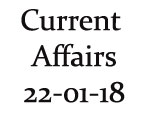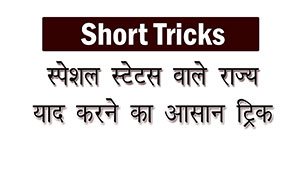-
Current Affairs 22nd January 2018
Updated : 23-Jan-2018
Current Affairs 22nd January 2018 - Important Points
- GST Council cuts rates on how many goods and services - 82
- Cyber Surakshit Bharat initiative launched by - Union Government
- India to surpass which country as fastest growing large economy in 2018 - China
- Who has been appointed as new Chief Election Commissioner - Om Prakash Rawat
Current Affairs 22nd January 2018 - Details
GST Council cuts rates on how many goods and services - 82
The 25th GST Council meeting led by Finance Minister Arun Jaitley on 18 January 2018 endorsed rate cuts on 83 goods including 53 services and 29 items and the inintiation of anti-evasion estimate to take care of faltering indirect tax revenue.
The goods and services that will support cheaper GST henceforth comprises tailoring, drip irrigation systems, precious stones, old cars, bio-diesel and cooking-as. The new prices will come into effect from 25 January.
As per an official release, the tax on old and used vehicles and buses running on bio-diesel would be decreased to 18% from the present 28%, while diamonds and precious stones will be taxed at 0.25% and tailoring facilities at 5%.
Key Highlights
The GST council identified approximately 40 items as handlooms in order to safeguard the domestic industry and support employment. The Fitment Committee of Delegates will now finalise their prices.
The council also held talks on clarifying the Income Tax return filing process and a final conclusion on the same will be taken in the upcoming meeting via video conferencing.Conversations on inclusion of products outside GST comprising crude oil, natural gas, real estate and petroleum, will be taken up at the upcoming meeting.
Prices of goods such as drip, irrigation system, bio-diesel, packaged drinking water, bio-pesticides, among various have been decreased to 12% from 18%. Prices of 53 grouping of services will also now engage decreased Tax.
This would contain the E-Way Bill, which will initiate from 1 February. As many as 15 States have also finalized to roll out intra-State Bills from upcoming month.
Further, to simplify fiscal pressure on the finances of the Centre and States, the Council also finalized that ?35,000 crores from the united GST collections would be dispensed among them. As per the Mr.Jaitley, the move will help simplify the indirect tax positions of the Centre and States. He emphasized that the centre is well ahead of its direct tax goal and shown hope that indirect tax collections will be taken up as anti-evasion measures are set-up in place.
Reverse Charge Mechanism (RCM)
The council will also take into the account the re-introduction of the reverse charge mechanism for traders under the composition plan, following guidances by the law review committee.
The charge is suitable for a registered trader, if he buys items from a non-GST registered dealer.However, the recipient of the items is qualified for input Tax Credit, while the unregistered trader is not.
While registered tax-payers were not ready to take the extra burden of paying tax, unregistered tax-payers would have run out of business if registered dealers did not purchase items from them.Cyber Surakshit Bharat initiative launched by - Union Government
The Ministry of Electronics and Information Technology released Cyber Surakshit Bharat plan in cooperation with National e-Governance Division and industry partners at an introductory event in Delhi on 19 January 2018.
The move is focused at strengthening the cybersecurity environment in India, in line with Prime Minister Narendra Modi’s vision for a Digital India.
The plan was initiated by the Minister of State for Electronics & Information Technology and Tourism, K J Alphons in the presence of Union Information Technology Secretary Ajay Prakash Sawhney and Law Secretary Suresh Chandra and various famous producers.
Talking on the occasion, K J Alphons informed that Digital India has resulted to a rapid transformation in the governance structure and to maker sure good governance, the private sector must come forward.
Key ObjectiveThe plan has been conceptualized to expand awareness about cyber-crime and forming capacity for safety measures for Chief Information Security Officers and frontline IT work force across all government sectors.
- It will be working on the 3 principles of education, awareness and enablement.
- It will contain an awareness scheme on the significance of cyber-security.
- It will also contain a series of seminars on the leading practices and enablement of the administrators with cyber-security health tool kits to handle and diminish cyber threats.
India to surpass which country as fastest growing large economy in 2018 - China
As per the Sanctum Wealth Management report, India will become the quickest growing mega economy in the world in 2018, outstanding China and the nation’s equity marketplace will bounce to become the 5th largest in the world.
The report explains that when the remaining of the world suggests low growth and insufficient structural change, India, is seen as a reforming economy with the expectation of strong long-term expansion.
Key Highlights
- India is seeking to achieve a 7.5% growth in its economy, while the grown economies are pushing for 2-3% growth.
- India also gains from a favourable contrast to other emerging areas such as China, the growth pace of which is believed to be slower than earlier.
- However, if inflation, markets are not likely to register more gains. Muted profits could also afect market performance.
Significance - According to the report, a large factor that has altered is that the domestic purchaser now sets market prices.
- The report also found that Aadhaar, GST, Jan Dhan Yojana, Demonetisation are working to form a new inclusive infrastructure in India.
Who has been appointed as new Chief Election Commissioner - Om Prakash Rawat
Senior-most Election Commissioner, Om Prakash Rawat was appointed as the Chief Election Commissioner in the Election Commission on 21 January 2018.
As per a notification by the Union Law Ministry, Rawat will assume the alteration of office of the Chief Election Commissioner starting from 23 January 2018. He would be succeeding CEC Achal Kumar Joti, who retires on 22 January.
The nomination was done by President of India, Ram Nath Kovind. Apart from this, the President also designated retired IAS officer Ashok Lavasa as the Election Commissioner starting from the date he assumes the office, to fill up the vacancy that would have arisen in the 3-member committee after Joti's retirement
The 3rd member of the top election organization is election commissioner Sunil Arora.
About Om Prakash Rawat
Born on 2 December 1953, Rawat is a 1977 batch IAS officer from Madhya Pradesh.
He has given several key portfolios at both Central and state positions.
He has worked as the Secretary in the Department of Public Enterprises in the Ministry of Heavy Industries.Prior to that, he worked as a Director in the Defence Ministry in 1993. During his working period, he was sent to South Africa in 1994, as the United Nation election observer to supervise the country’s 1st post-apartheid elections.
He also earlier worked as the Principal Secretary to Babu Lal Gaur, the then CM of Madhya Pradesh between 2004 and 2006. He was appointed as the Union Public Enterprise Secretary by the Appointments Committee of the Cabinet in March 2012. He retired from the position in December 2013. He was designated to Election Commission in August 2015.














